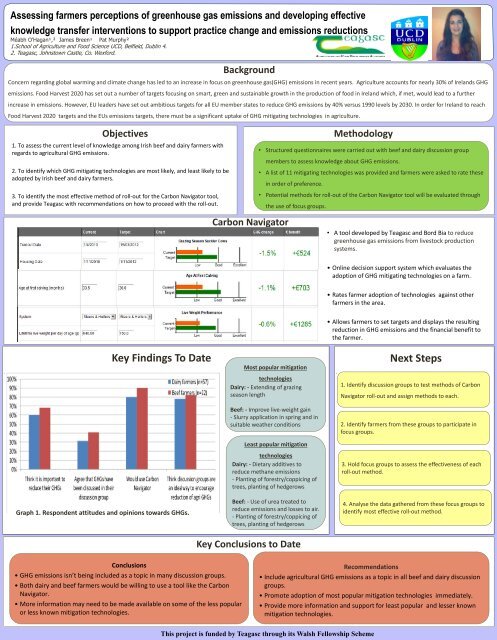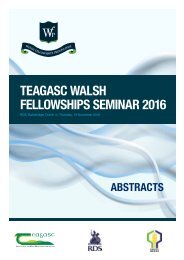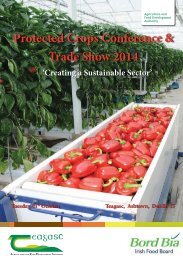Driving Farm Innovation through Knowledge Transfer
1S93ppX
1S93ppX
Create successful ePaper yourself
Turn your PDF publications into a flip-book with our unique Google optimized e-Paper software.
Assessing farmers perceptions of greenhouse gas emissions and developing effective<br />
knowledge transfer interventions to support practice change and emissions reductions<br />
Méabh O’Hagan¹,² James Breen¹ Pat Murphy²<br />
1.School of Agriculture and Food Science UCD, Belfield, Dublin 4.<br />
2. Teagasc, Johnstown Castle, Co. Wexford.<br />
Background<br />
Concern regarding global warming and climate change has led to an increase in focus on greenhouse gas(GHG) emissions in recent years. Agriculture accounts for nearly 30% of Irelands GHG<br />
emissions. Food Harvest 2020 has set out a number of targets focusing on smart, green and sustainable growth in the production of food in Ireland which, if met, would lead to a further<br />
increase in emissions. However, EU leaders have set out ambitious targets for all EU member states to reduce GHG emissions by 40% versus 1990 levels by 2030. In order for Ireland to reach<br />
Food Harvest 2020 targets and the EUs emissions targets, there must be a significant uptake of GHG mitigating technologies in agriculture.<br />
Objectives<br />
1. To assess the current level of knowledge among Irish beef and dairy farmers with<br />
regards to agricultural GHG emissions.<br />
2. To identify which GHG mitigating technologies are most likely, and least likely to be<br />
adopted by Irish beef and dairy farmers.<br />
3. To identify the most effective method of roll-out for the Carbon Navigator tool,<br />
and provide Teagasc with recommendations on how to proceed with the roll-out.<br />
Methodology<br />
• Structured questionnaires were carried out with beef and dairy discussion group<br />
members to assess knowledge about GHG emissions.<br />
• A list of 11 mitigating technologies was provided and farmers were asked to rate these<br />
in order of preference.<br />
• Potential methods for roll-out of the Carbon Navigator tool will be evaluated <strong>through</strong><br />
the use of focus groups.<br />
Carbon Navigator<br />
• A tool developed by Teagasc and Bord Bia to reduce<br />
greenhouse gas emissions from livestock production<br />
systems.<br />
• Online decision support system which evaluates the<br />
adoption of GHG mitigating technologies on a farm.<br />
• Rates farmer adoption of technologies against other<br />
farmers in the area.<br />
• Allows farmers to set targets and displays the resulting<br />
reduction in GHG emissions and the financial benefit to<br />
the farmer.<br />
Key Findings To Date<br />
Next Steps<br />
.<br />
Most popular mitigation<br />
technologies<br />
Dairy: - Extending of grazing<br />
season length<br />
.<br />
1. Identify discussion groups to test methods of Carbon<br />
Navigator roll-out and assign methods to each.<br />
Beef: - Improve live-weight gain<br />
- Slurry application in spring and in<br />
suitable weather conditions<br />
2. Identify farmers from these groups to participate in<br />
focus groups.<br />
Least popular mitigation<br />
technologies<br />
Dairy: - Dietary additives to<br />
reduce methane emissions<br />
- Planting of forestry/coppicing of<br />
trees, planting of hedgerows<br />
3. Hold focus groups to assess the effectiveness of each<br />
roll-out method.<br />
Graph 1. Respondent attitudes and opinions towards GHGs.<br />
Beef: - Use of urea treated to<br />
reduce emissions and losses to air.<br />
- Planting of forestry/coppicing of<br />
trees, planting of hedgerows<br />
4. Analyse the data gathered from these focus groups to<br />
identify most effective roll-out method.<br />
Key Conclusions to Date<br />
Conclusions<br />
• GHG emissions isn’t being included as a topic in many discussion groups.<br />
• Both dairy and beef farmers would be willing to use a tool like the Carbon<br />
Navigator.<br />
• More information may need to be made available on some of the less popular<br />
or less known mitigation technologies.<br />
Recommendations<br />
• Include agricultural GHG emissions as a topic in all beef and dairy discussion<br />
groups.<br />
• Promote adoption of most popular mitigation technologies immediately.<br />
• Provide more information and support for least popular and lesser known<br />
mitigation technologies.<br />
This project is funded by Teagasc <strong>through</strong> its Walsh Fellowship Scheme




